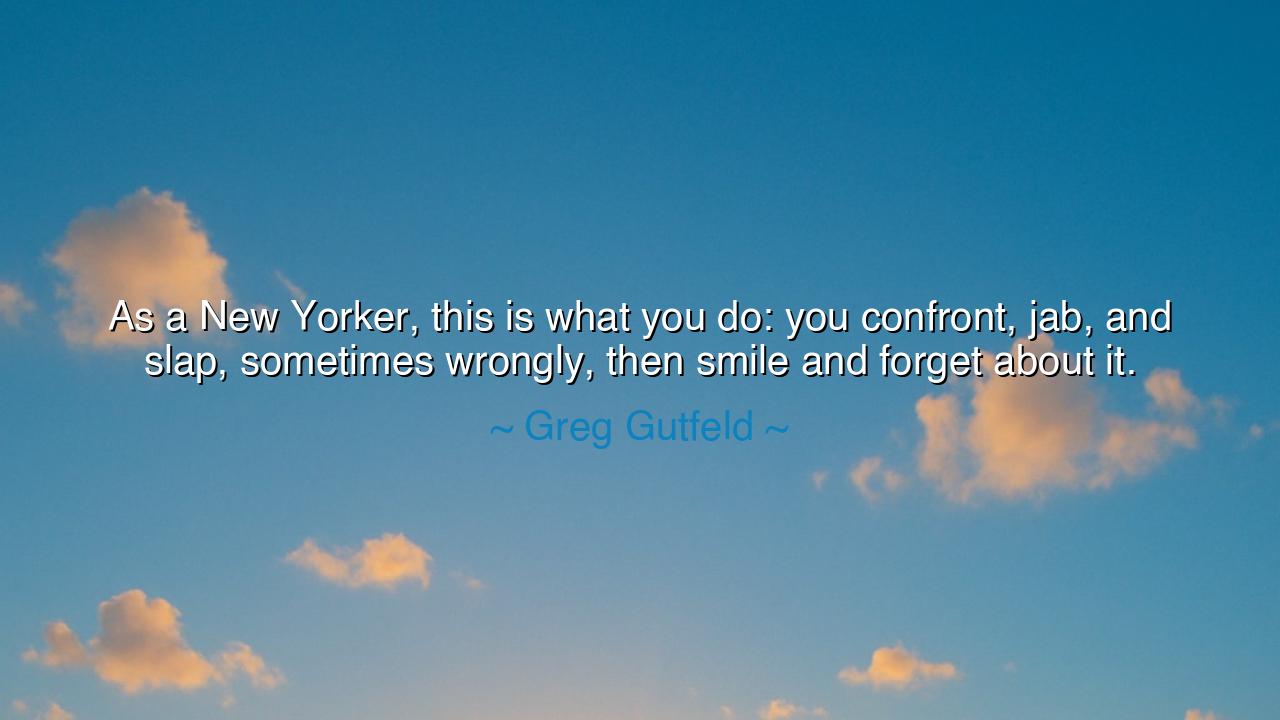
As a New Yorker, this is what you do: you confront, jab, and
As a New Yorker, this is what you do: you confront, jab, and slap, sometimes wrongly, then smile and forget about it.






The words of Greg Gutfeld ring with the spirit of a city forged in iron and fire: “As a New Yorker, this is what you do: you confront, jab, and slap, sometimes wrongly, then smile and forget about it.” At first, they may sound like a simple jest, a caricature of urban life. But hidden within them is the pulse of a great truth—that in some places, and in some souls, life is lived through sharpness, boldness, and resilience, yet also through the mercy of forgetting. It is a way of being that transforms conflict into survival, and survival into strength.
To confront is the first act of the New Yorker, as Gutfeld describes it. In the ancient world, confrontation was never avoided by those who lived in crowded cities, where space was scarce and competition fierce. To confront is to acknowledge reality without disguise, to look into the eyes of challenge without flinching. It is not cruelty, but clarity, and it carries the power to shatter illusions. In New York, a place of endless motion and relentless ambition, confrontation becomes the daily ritual of life: direct, immediate, unsoftened by ceremony.
Then comes the jab and the slap—symbols of the sharp tongue, the quick retort, the instinctive defense of one’s ground. Here we find the humor and the edge of those who thrive in the world’s harshest arenas. The jab may wound, the slap may sting, and yes, sometimes they are dealt unjustly. Yet they are not given as mortal blows. They are sparks struck in the heat of the moment, born from the friction of lives pressed too close together, from the rhythm of survival in a crowded world.
And yet, after the confrontation and the clash, comes the smile. This is the secret jewel hidden within Gutfeld’s words. For what might otherwise fester into hatred is released by the lightness of spirit. To smile is to acknowledge: the conflict was real, but it does not bind us. It is the recognition that words and gestures, however sharp, need not build permanent walls. In this way, the city teaches its people the art of forgiveness—not the lofty forgiveness of saints, but the practical forgiveness of neighbors who must live together again tomorrow.
History has seen such a rhythm in other great centers of humanity. In the bustling marketplaces of Athens, philosophers and tradesmen would argue fiercely in the morning, slashing at one another’s ideas with words like daggers. But when the sun set and the wine flowed, they would laugh together, having forgotten the wounds of the day. It was not hypocrisy but wisdom: the understanding that the clash of ideas sharpens the mind, but the warmth of friendship sustains the heart. In this, Athens and New York are kin, bound by the rhythm of confrontation and release.
The lesson is clear: life will always bring friction, especially in places of great ambition and density. We will speak too sharply, act too rashly, strike when we should have stayed still. But we must not let these sparks ignite a fire that consumes us. Instead, we must learn the art of release—the ability to smile and to forget, lest bitterness choke the joy of living. The clash may be inevitable, but the smile is always a choice.
Therefore, let us act with intention. When you must confront, confront boldly, but not cruelly. When you must jab, do so with wit, not malice. And when the clash is done, release it with a smile, letting the past slip into nothingness. For to live without friction is impossible, but to live without forgiveness is unbearable. In this balance lies the true wisdom of the city, and the wisdom of the human heart.
Carry forward Gutfeld’s truth: “Confront, jab, slap… then smile and forget about it.” May it remind you that life is too short to cling to every wound, and too rich to live in silence or fear. Speak boldly, act bravely, but always let the smile close the day. This is not merely the spirit of New York—it is the spirit of resilience, the eternal rhythm of humanity itself.






AAdministratorAdministrator
Welcome, honored guests. Please leave a comment, we will respond soon